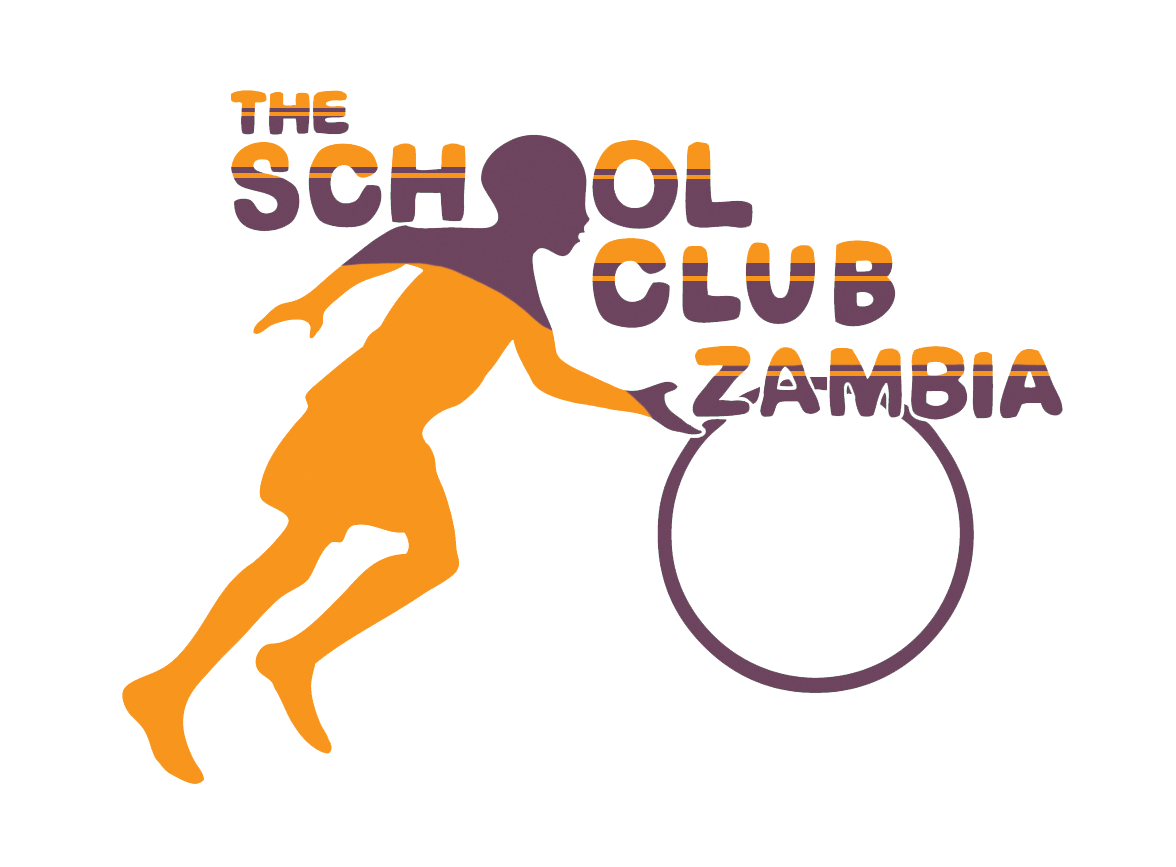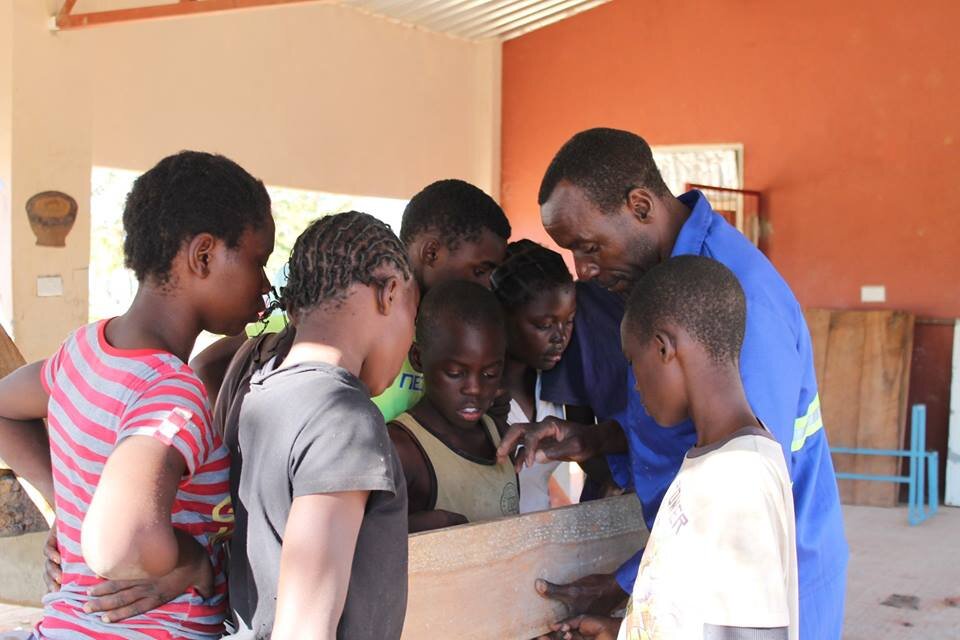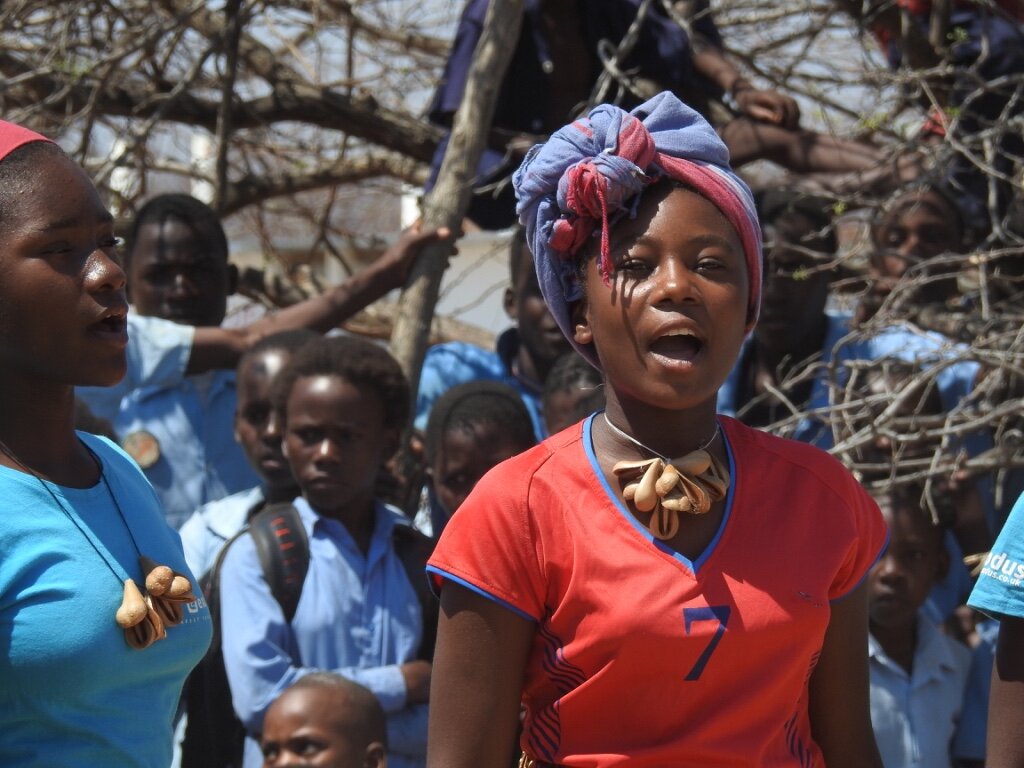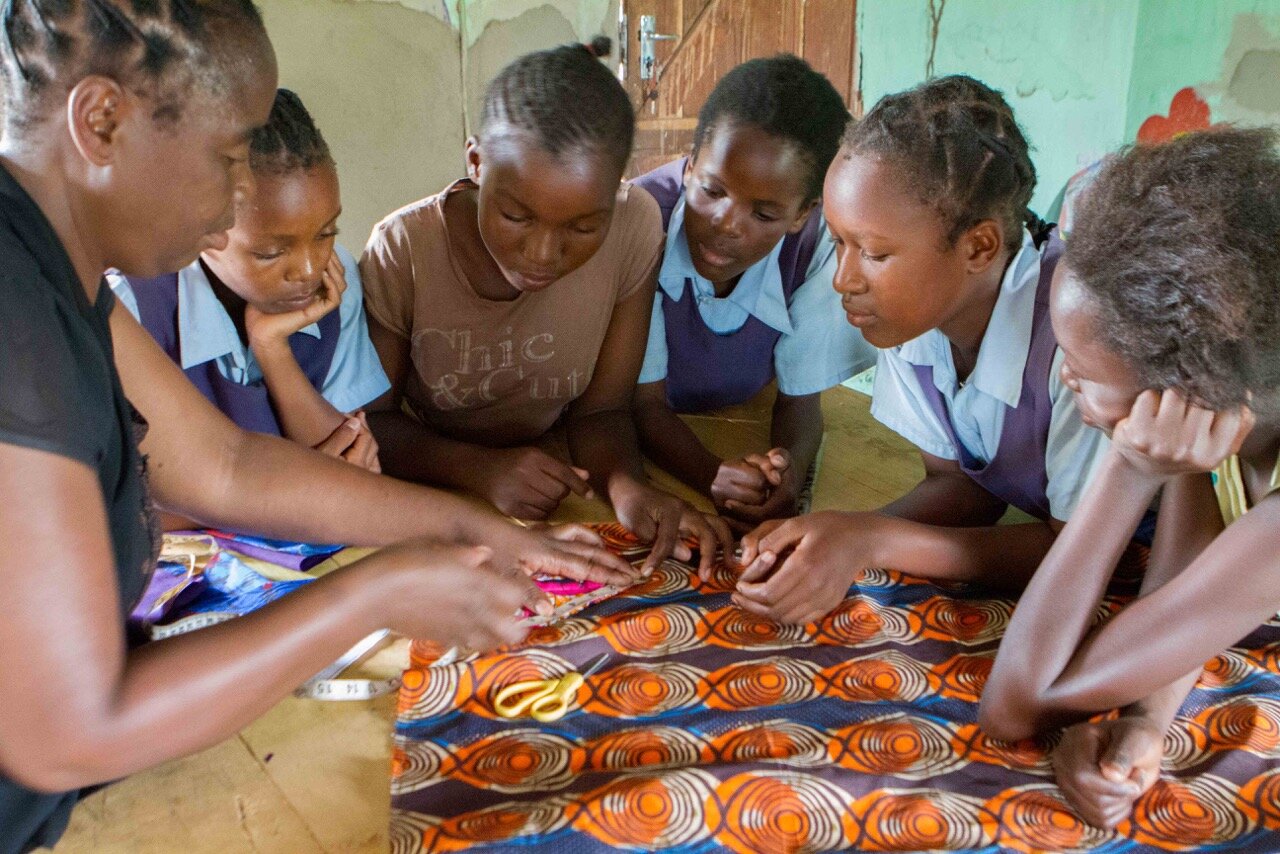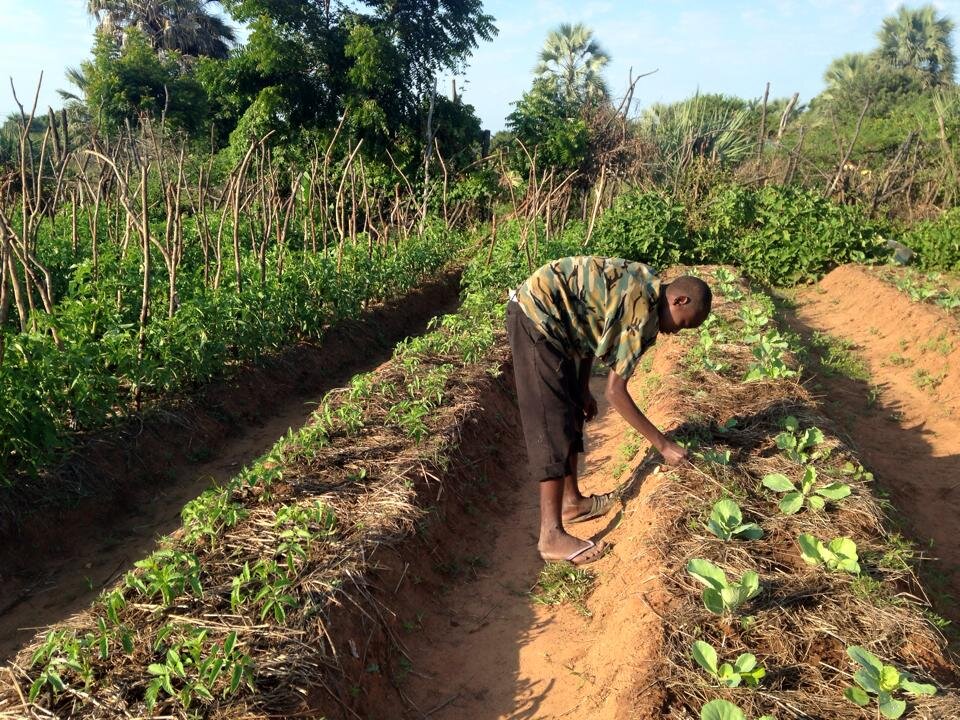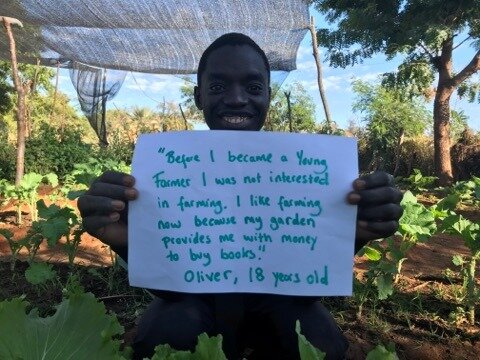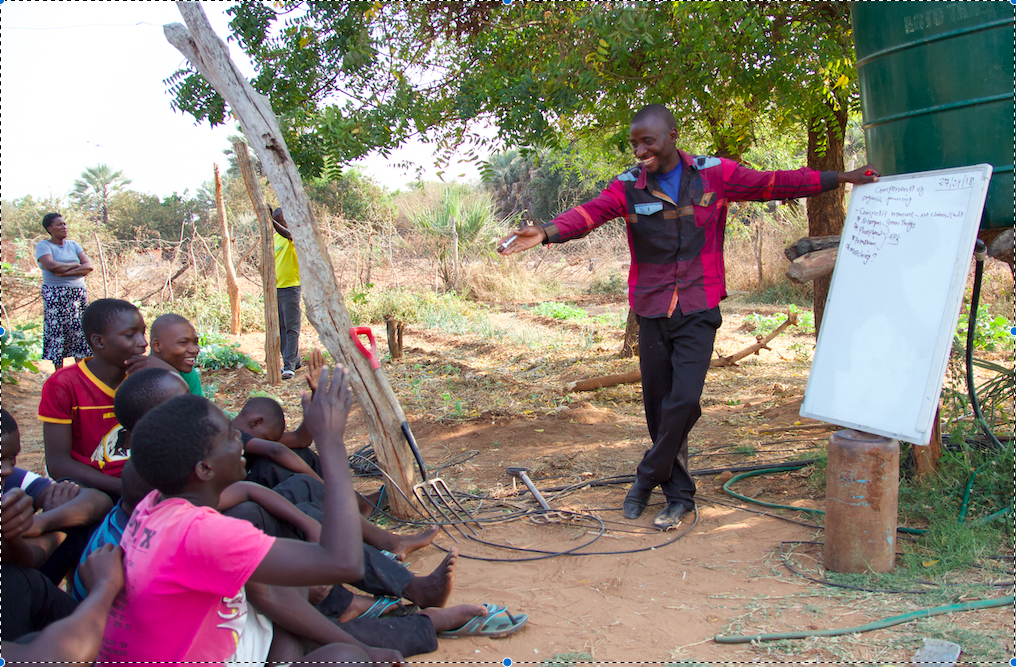School Club Zambia has 3 strategic objectives which underlines all of our work:
1. Increase the quality, relevance and sustainability of education in our targeted schools (SDG 4)
2. Reduce youth unemployment and increase household food security in our targeted communities (SDG 8)
3. Promote gender equality by overcoming the specific barriers that prevent girls from reaching their potential (SDG 5)
In order to practically achieve our strategic objectives we developed our 4 thematic and cross-cutting impact areas of self-financing schools; vocational education; literacy development and girls education.

Self-Financing Schools
Since the early 1990s schools in Zambia have established small income generating activities like chicken projects or gardens to raise extra money for their running costs. However, the most vulnerable schools in the country have always struggled to raise the money to start-up a school business and often lack the technical knowledge to launch and run the businesses successfully. In 2019, the Ministry of Education implemented a new policy that made income generating activities compulsory at all schools in response to the rising costs of essential resources like chalk and paper.
Since 2011 our model has supported schools to launch and sustain a number of diverse businesses to enable the schools to become financially and environmentally sustainable. This often includes establishing clean sources of water at schools (boreholes and water harvesting systems) and providing access to solar power if there is no mains electricity. The businesses are managed by our student-led Enterprise Committees who receive training through SCZ’s Enterprise Committee Training scheme.
Between March 2019 - April 2022 we piloted a new “Agricultural Hubs for Sustainable Schools Project” in partnership with iSchool, the Ministry of Education and the Ministry of Agriculture. This 3 year project aimed to reduce schools long-term overheads through the introduction of innovative e-learning technology and by establishing a school-run agri-business which will improve local farmers access to farming input tools.
In May 2019 our baseline showed that 61% of a sample of 500 families that we interviewed taking part on the project had less than K500 (30 dollars) a month to spend on their household essential items like food, soap and firewood. This could be broken down into 61% of the families living off US 1.07 a day in 2019. Only 13% had more than K800 ($50) a month (or $1.70 a day) and 3% had more than K1500 ($90) a month (or $3.20 a day)
At the end of our Agricultural Hubs for Sustainable Schools Project we had -
-Trained over 1,950 rural farmers in adaptive farming strategies whilst providing them with to access to farming input tools through our school-run agricultural hub shops. This led to a 300% increase in farmers growing maize and a 20% increase in families collecting and storing rainwater.
-Seen a 25% reduction in extreme poverty in our 500 targeted households, whilst 5% of families had risen above the World Bank poverty line for Zambia
Vocational Education
UPSKILLING Zambia’s Youth Through Vocational Education
Despite 75% of Zambia’s population working in agriculture, only a tiny fraction—just 1.5 million hectares out of 42 million—are cultivated each year. To address this gap, our model focuses on creating agriculturally-based school businesses that provide hands-on vocational training. We aim to equip young people with the skills to improve farming techniques and explore diverse future livelihoods, including growing different crops and establishing sustainable farming enterprises.
Young Farmers Club
Since 2014, School Club Zambia has trained over 420 students in organic agriculture through our year-long programmes and boot camps under the Inter-Generation Girls Alliance. Our students learn practical skills like mulching, crop rotation, tree planting, composting, and rainwater harvesting—techniques vital for combating the immediate impacts of climate change. They also gain business skills in budgeting, marketing, and grading their produce.
We’ve supported 18 former young farmers to obtain professional agricultural qualifications, many of whom now provide free farming advice to local farmers. In 2022, the Ministry of Agriculture adopted our training model, using our school Agricultural Hub Shops at two schools as official farmer training centers, expanding our impact even further.
Young Tailors Club
In 2014, we helped Kariba South Primary establish the Young Tailors Club, which has trained over 140 students. The club’s success was recognized globally when they won the Top Prize in Teach a Man to Fish’s School Enterprise Challenge. Notably, they manufacture reusable sanitary pads for our girls’ education programmes, using only locally sourced and recycled materials.
Building on this success, we plan to expand the project at our upcoming Climate Resilience Centre—expected to open by 2026. The new centre will feature a tailoring and weaving studio, providing opportunities for young people to learn essential skills and reconnect with Tonga weaving traditions.
Happy Layers Club
In 2017, our Innovation Ambassadors Sunny and Mabulani launched the Happy Layers Club at Kariba South School to teach students how to care for 100 school chickens. Since then, the programme has expanded to Chisyabulungu and Siansowa schools, with annual exchange visits fostering shared learning.
This business is highly profitable, generating around K3,000 (£250) per term—three times the average income of government schools—demonstrating the potential of youth-led enterprises to create sustainable income streams.
Enterprise Challenge
In August 2019, we launched our first Enterprise Challenge in Sinazongwe district, engaging four schools in a 12-month entrepreneurial competition. Forty students participated in a week-long startup bootcamp, then competed to develop the most profitable business idea. Congratulations to Siansowa’s team for winning with their cupcake business!
Due to its tremendous impact on developing essential life skills, we look forward to re-launching this challenge soon, inspiring more young entrepreneurs in regions with limited employment opportunities.
Inter-Generation Girls Alliance
In February 2021, we introduced a groundbreaking 12-month vocational training project for 30 girls on the brink of dropping out or who had recently left school. Named Next Generation Girls, the programme provided training in IT, entrepreneurship, bricklaying, carpentry, tailoring, climate-smart technology, and cooking.
Encouragingly, three years later, 28 of these girls have made it to grade 12—an incredible achievement in a context where only 5% of girls in rural Zambia reach this level. Building on this success, we secured funding for the Inter-Generation Girls Alliance, which involves mothers, grandmothers, boys, and men in the community. This holistic approach fosters support networks and advocates for girls’ rights.
Today, in its fourth year, over 90% of participants are still in school, demonstrating the lasting impact of our vocational and community-driven initiatives.
Eco-Life Clubs: Cultivating Climate Consciousness
Our Eco-Life Clubs is a dynamic two-year project currently supported by the UNDP GEF Small Grants Programme, running until March 2026. This initiative employs a peer educator approach to empower young people and their families with vital knowledge about climate change and practical ways to reduce its impact.
A key focus of the project is tackling the alarming rise in charcoal burning—a major contributor to deforestation in the district. Many community members rely on charcoal as their only source of income, making it a complex issue to address. Our question remains: What will the future look like if we continue to lose our trees? Through education and community engagement, we aim to inspire sustainable alternatives and protect vital ecosystems.
The project has trained 120 children and their grandparents across five schools, fostering intergenerational collaboration and community resilience. One of the most inspiring achievements so far has been a radio station broadcast reaching over 125,000 listeners, where participants shared simple but effective strategies for combating climate change and protecting the environment.
In addition to raising awareness, Eco-Life Clubs have planted over 200 trees and constructed 10 demonstration rainwater harvesting tanks—showcasing practical solutions that communities can adopt to adapt to climate change and conserve natural resources.
Literacy Development
Promoting Literacy for Every Child
At School Club Zambia, we believe that literacy is the foundation for a brighter future—starting from the very earliest stages of a child's life. Yet, in Zambia, literacy levels in rural areas lag far behind those in cities. While the national literacy rate is approximately 62.6%, only about 49.8% of rural residents can read and write, compared to 78.2% in urban regions. This gap underscores the urgent need to ensure all children have access to quality education.
Since 2016, we’ve been dedicated to transforming this reality. We’ve created vibrant, interactive outdoor learning spaces at our partner schools to inspire curiosity and engagement beyond the classroom. We’ve also provided re-training courses for teachers, supplied e-learning equipment, established pre-school classrooms, and distributed specialised English as a Second Language books through our partner, Happy Readers in Zimbabwe.
Thanks to these efforts, we’ve seen remarkable progress—reading levels have jumped from just 5% to over 60% in many schools! But we know there is still much work to do. We continually seek innovative ways to advance literacy so that every child leaves school equipped with the skills and confidence to succeed.
In November 2021, we partnered with Gursney Overseas Aid to build two additional pre-school classrooms and train 10 early childhood educators. Our goal remains clear: to unlock the potential of every child through access to high-quality, inclusive education that empowers them for a lifetime.
Girls Education
Empowering Girls in Rural Zambia: Breaking Barriers and Building Futures
Girls in Zambia, particularly in rural areas like Sinazongwe where School Club Zambia operates, face extraordinary challenges. Deep-rooted cultural norms and economic hardships contribute to stark inequalities. UNICEF reports that 31% of young women in Zambia are married before the age of 18, and 28% have their first child by that age. Tragically, 77% of girls in rural areas will never complete a full 12 years of schooling, limiting their opportunities and perpetuating cycles of poverty and inequality.
Globally, over 650 million women were married before the age of 18, and Zambia is ranked among the top 20 hotspots for child marriage by Girls Not Brides. Poverty, gender inequality, and limited access to education are the key drivers—especially during drought years, when families see marriage as a way to reduce their economic burden by having one less mouth to feed.
Over the past decade, we have developed a girl-led, multi-faceted approach to address these challenges. Our programmes focus on empowering girls with the tools, information, and confidence to stay in school and reach their full potential. This includes providing safe spaces for girls to manage their menstrual health, distributing culturally preferred reusable sanitary wear—designed and made by the girls themselves—and offering vital information on sexual and reproductive health rights.
We also ensure consistent efforts to end period poverty across 11 schools by distributing sanitary products and actively participating in annual Menstrual Health Day events. These celebrations raise awareness within the community about the importance of menstrual health and break down taboos surrounding periods.
Monica, School Club Zambia’s Programme Assistant, shares:
"The issues facing girls are complex and require a multi-tiered approach. It is not just about distributing menstrual health products to keep girls in school if they do not understand why they are bleeding each month. Girls have told us stories about being terrified, thinking they have HIV the first time they bleed. We need to do more to support these girls and prevent them from not attending school due to issues that are well within our control to help."
Additionally, girls are involved in promoting health services at local clinics, helping to establish youth-friendly corners where they can access support and information. Our goal is to foster an environment where girls are informed, confident, and supported to make choices that shape their futures.
Success Stories and Impact
In January 2020, we launched a pioneering two-year project, “Girls of Sinazongwe: a child-led approach to reducing girl absenteeism,” supported by the UK Government’s FCDO under UK Aid Direct. The results have been remarkable: a 40.4% reduction in school absenteeism among girls and a 900% increase in family planning service usage at six local clinics—significantly improving health outcomes and keeping girls in education.
In April 2024, we celebrated the conclusion of a three-year project in partnership with Play It Forward, the Scottish Government, and Comic Relief. This initiative aimed to re-enrol 750 girls back into school through a sport-for-change model. Over the course of the project, 445 girls re-entered education, paving the way for brighter futures and breaking the cycle of poverty.
The programme also delivered notable improvements in literacy and numeracy, with a 32% increase in literacy rates and a 36% rise in numeracy skills among participating girls. The establishment of a girls’ football league not only promoted health and teamwork but also provided a platform for teaching vital life skills and raising awareness about sexual and reproductive health rights. Furthermore, entrepreneurship training and micro-finance initiatives enabled many girls to start small businesses, fostering financial independence and resilience.
Our Commitment
We believe that every girl deserves the chance to learn, lead, and succeed. Through our targeted programmes, community engagement, and strategic partnerships, we are working tirelessly to remove barriers and unlock the potential of Zambia’s girls—creating a future where gender equality is a reality, not just a goal.
“Our school now has 5 social enterprises including an agricultural shop, tailoring centre, organic garden, internet cafe and chickens. We have been able to build a store-room, teacher’s house, toilet block and complete a 1x3 classroom block from the profits!
”
““The Young Farmers visit to a commercial farm really opened the children’s eyes to the possibility of farming! Most young people think that farming is only on a small scale and they didn’t realise that many of the richest people in Zambia are also farmers. It really changed the way they see their future rather than just believing that all they can do is fish.””
“We have a huge problem in our community of girls getting pregnant and not finishing school. Often girls will spend the night on the fishing rigs for as little as K5 (50p) or even for a small bowl of fish, not knowing the consequences such actions can have on their future. I am so thankful that SCZ is running workshops to educate our girls on sexually transmitted diseases and sexual reproductive health, so that they (the girls) can start protecting themselves”. ”
